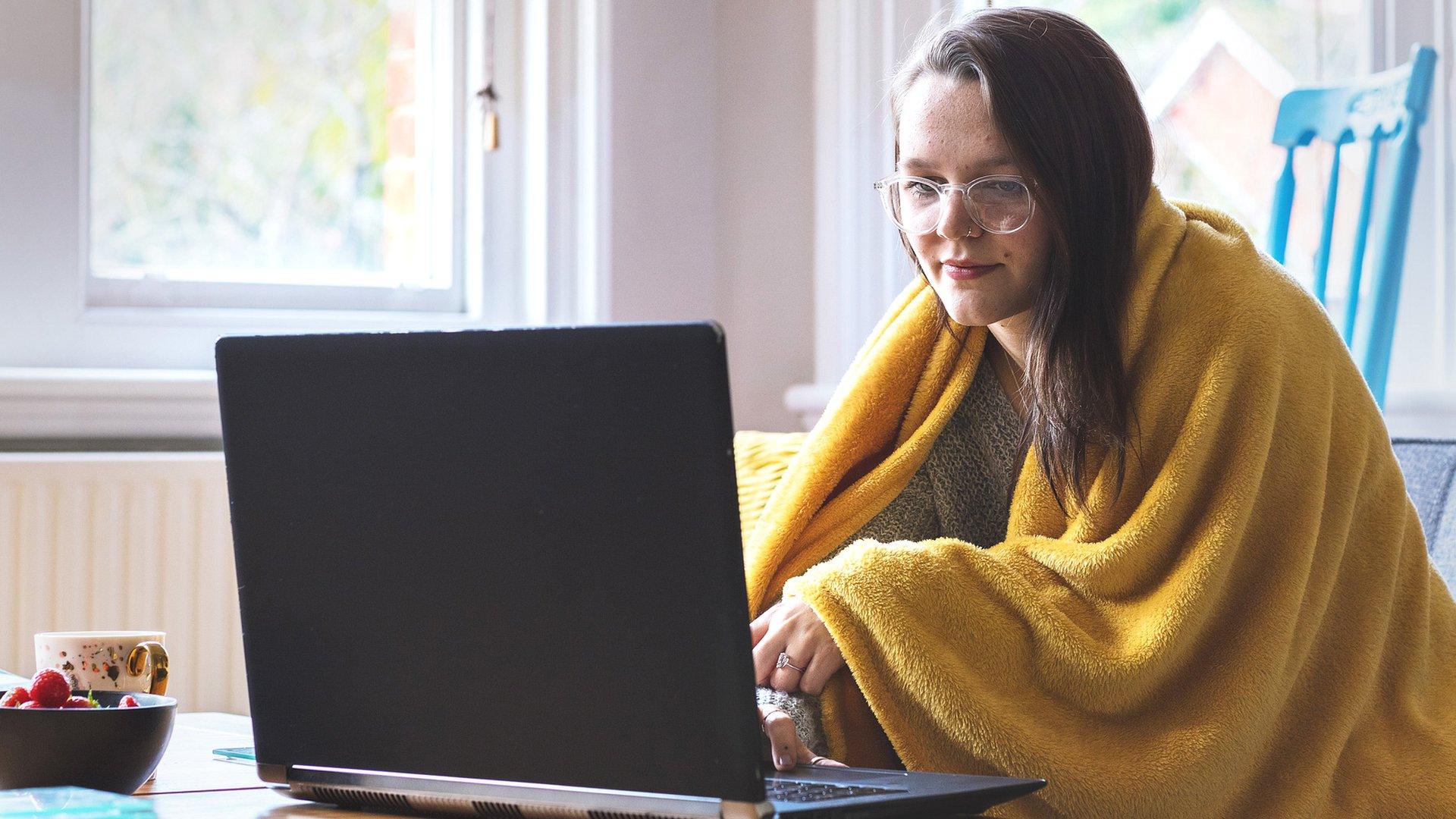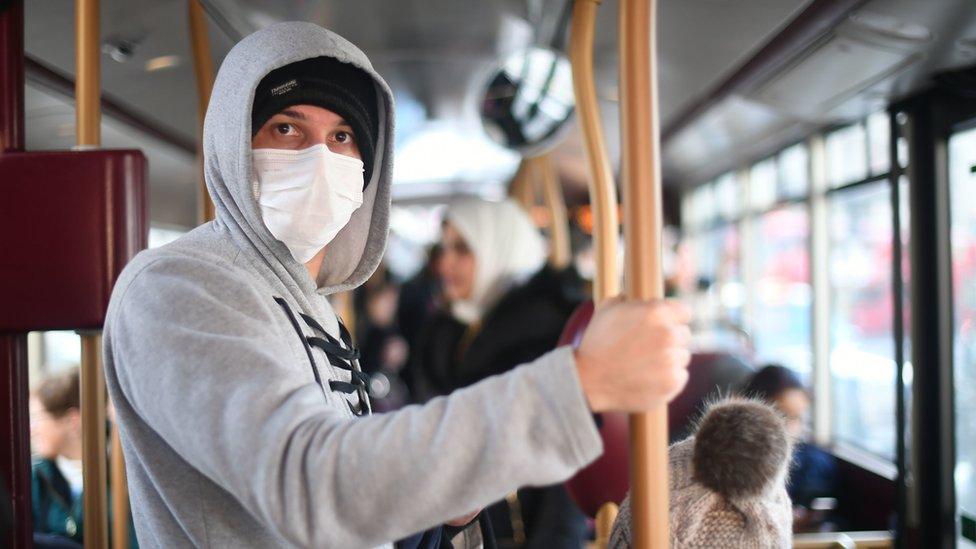Coronavirus: Three days more sick pay for self-isolating workers
- Published
- comments

Workers will get statutory sick pay from the first day off work, not the fourth, to help contain coronavirus, the prime minister has said.
Boris Johnson said people who self-isolate are helping to protect others from the virus and should not be "penalised for doing the right thing".
It means those receiving statutory sick pay would get an extra £40.
The number of confirmed cases increased by 34 on Wednesday to a total of 85 - up from 51 on Tuesday.
England's chief medical officer earlier said it was "likely" the virus will become an epidemic in the UK.
Prof Chris Whitty also told BBC Breakfast that up to 80% of the population could be infected with coronavirus, which causes Covid-19, "in the worst-case scenario".
Officials believe up to a fifth of the workforce may be off sick during the peak of an epidemic in the UK.

What do I need to know about the coronavirus?
HOW IS THE UK PLANNING FOR AN OUTBREAK: How prepared are we?
WHAT ARE THE SYMPTOMS? A simple guide
HOW TO SELF-ISOLATE: What you need to know
WHERE ARE WE WITH A VACCINE? Progress so far
A VISUAL GUIDE TO THE OUTBREAK: Virus maps and charts

In order to receive statutory sick pay (SSP) people must be earning at least £118 a week.
The change, which is being introduced in emergency legislation, is expected to mean an extra £40 for people receiving SSP - which is set at £94.25 a week and paid by employers.
But TUC general secretary Frances O'Grady said two million workers do not earn enough to qualify.
Prospect union added that freelancers and self-employed people would continue to face "the dilemma of no pay or going to work when it may be putting their colleagues at risk".
Labour leader Jeremy Corbyn asked Mr Johnson if the sick pay announcement would help those currently not eligible for statutory sick pay - such as those on zero hours contracts, or self-employed people.
The prime minister said "a great many" people would be entitled to SSP, adding: "Others will be entitled to help through existing systems such as universal credit and we are urgently looking at the application process to reflect on the advice on self-isolation."


This is a significant announcement by the prime minister, but it is far from the end of the debate over sick pay.
Clearly, the aim of paying statutory sick pay from day one is to ensure people with coronavirus do not feel financial pressure to come into work and risk spreading the disease. It is understood this change will only be temporary during the period of the outbreak, but may effectively apply to all illnesses.
Unions will argue this should be the case for any illness, at any time - not just when coronavirus is raging. They will also continue a campaign saying those on very low pay, particularly women, should be eligible. There is lobbying too for millions of freelancers and the self-employed, many of whom do not get sick pay.
Employers in the private sector, who will now face a bigger sick pay bill, will no doubt be pressing for financial support from the government.
More detail is needed over how this particular concession will work in the short-term, but in the long-term it may provide encouragement to those who say the whole system of sick pay is unfair and should be overhauled.

The announcement, which Mr Johnson made during Prime Minister's Questions, comes after NHS England sent a letter to hospital trusts and other health organisations outlining steps they should take to prepare for a possible surge in the number of patients.
Prime Minister Boris Johnson: "Nobody should be penalised for doing the right thing"
They have been asked to carry out more video consultations from home and to consider ways to increase the availability of hospital beds and resources.
A newly expanded information campaign has also been launched by the government to promote frequent hand-washing, for at least 20 seconds each time.
Government adverts across print, radio, online and billboards will urge people to wash their hands when they arrive at home or work, after they blow their nose, cough or sneeze, and before eating or handling food.
The BBC's Health team talks you through what the NHS says about protecting yourself from Covid-19
A hospital worker at the Cumberland Infirmary Carlisle in Cumbria is one of the latest people in the UK to test positive for the virus.
Colin Cox, director of public health at Cumbria County Council, said the member of staff had self-isolated after a trip to northern Italy, and "did not come into work and has not had any contact with patients".
Another Carlisle resident has also tested positive, Mr Cox said.
In other developments across the UK:
Guests who left a quarantined hospital in Tenerife have been told to self-isolate for a further week after a British woman at the hotel tested positive on 2 March
CCTV images have been released of four men wanted over an alleged racist attack on London's Oxford Street, reportedly motivated by virus fears
Two GP practices in Torquay have closed, external until mid March, after a pupil at a nearby grammar school tested positive
Sony has closed its offices in London, Paris and Gdynia - in Poland - and told employees to work from home as a precaution
The government has bowed to pressure and changed its stance on insurance so that businesses in England can be covered for coronavirus losses
Labour called on the government to provide emergency funding to support the NHS through the outbreak, as party leader Jeremy Corbyn warned the health service was already at 94% bed occupancy before the virus hit
London Book Fair, which was due to begin on 10 March, has been cancelled hours after major publishers such as HarperCollins pulled out
The Trades Union Congress (TUC) has urged the government to provide support for workers who do not qualify for statutory sick pay
The government's "battle plan" to combat the virus, announced on Tuesday, included proposals to bring back retired doctors and nurses and to free up beds by cancelling non-urgent operations.
About 90,000 people have been infected globally since the outbreak of coronavirus in Hubei province, China, in December, with cases in more than 50 countries and more than 3,000 deaths.
In developments outside the UK:
Italy is considering closing schools and universities across the country until mid-March - a decision will be taken ""in the next few hours", its education minister says. Italy is the worst-hit European country with some 2,260 cases and 79 deaths so far - including more than 20 in the past 24 hours
Argentina and Chile have reported their first cases
There are fears of global shortages of some common drugs after India limited the export of certain medicines
Grants and low-cost loans are part of a $12bn (£9.4bn) emergency aid package to help developing countries
And Australians have been stockpiling toilet paper after the country's first death was reported

How have you been affected by coronavirus? Share your experiences by emailing haveyoursay@bbc.co.uk, external.
Please include a contact number if you are willing to speak to a BBC journalist. You can also contact us in the following ways:
WhatsApp: +44 7756 165803
Tweet: @BBC_HaveYourSay, external
Send pictures/video to yourpics@bbc.co.uk, external
Please read our terms & conditions and privacy policy
- Published29 May 2020

- Published4 March 2020
